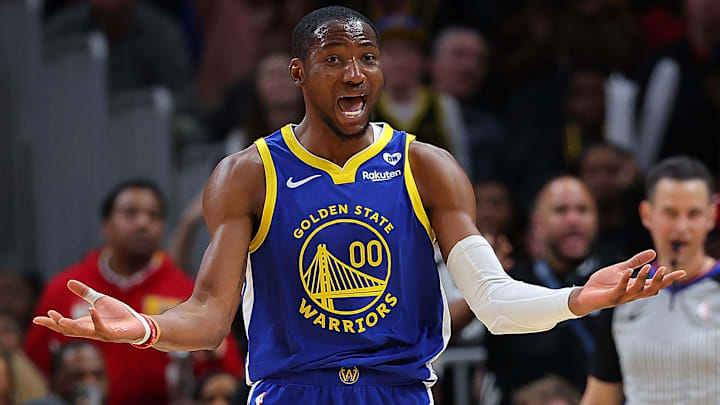After agreeing to sign-and-trade Duncan Robinson to the Detroit Pistons for Simone Fontecchio, the Miami Heat have cemented their direction for the rest of the NBA offseason. In doing so, they have also made it clear that they want no part of a Jonathan Kuminga trade.
This isn’t about the Robinson move alone, though it will have a logistical impact on how Miami could acquire the Golden State Warriors’ combo forward. No, this is more about the Heat’s overarching direction.
A nothing burger of an offseason (so far) seems to indicate they’re doing what team president Pat Riley and general manager Andy Elisburg were never expected to do: lean into a youth movement, potentially even a full-fledged gap year, if not a reset that lasts longer than one season.
Going on 23, Kuminga technically fits any type of window Miami wants to explore. But the path to acquiring him via sign-and-trade was already fraught with complications thanks to the Base Year Compensation rule. It is now riddled with more hurdles and holes.
Trading for Jonathan Kuminga is officially too complicated
The Heat have to send something to the Warriors for Kuminga. Robinson’s salary slot loomed as one of the best chips in those discussions. It lost luster once he exercised his early termination option and became a free agent, but there were still double sign-and-trade structures that could have worked, in which he ended up with Golden State or another team, and the Heat also sent other compensation to the Dubs.
That scenario is officially off the table. And the Heat don’t have enough sensible packages left to cobble together.
Andrew Wiggins is too expensive to make any sign-and-trade with Kuminga work. Terry Rozier’s expiring money is probably too high as well—particularly when his market value is at its absolute nadir.
Mashing together two to three of Haywood Highsmith ($5.6 million), Nikola Jovic ($4.4 million), Kyle Anderson ($9.2 million), Jaime Jaquez Jr. ($3.9 million), and Fontecchio’s $8.3 million expiring deal (once it can be legally aggregated) still offers a potential sign-and-trade pathway. Even then, the Heat may need third-party facilitators to account for Base Year Compensation.
More critically, what becomes of their rotation if they ship out three rotation players for one? They aren’t that deep in the first place.
Most telltale of all, Miami continues to operate in a way that suggests it wants a ton of flexibility next summer. Davion Mitchell’s two-year deal is fully guaranteed, but he’ll be an expiring contract by the 2026 offseason, and his salary fits into non-taxpayer mid-level exceptions if the team needs to offload him then. The Heat could be working with gobs of cap space in 2026. Especially if Wiggins opts out.
Giving Kuminga a multi-year contract eats into whatever financial runway the Heat are carving out right now. Maybe they believe that he’s worth it—that he’s better than anyone they could acquire next summer. But they’re not really acting like it.
Latest rumors suggest the Heat are out of the Jonathan Kuminga sweepstakes
Jake Fischer’s latest information dump over at The Stein Line backs up everything we lay out here. He name-checks the New Orleans Pelicans, Chicago Bulls, and Sacramento Kings as those most interested in a Kuminga sign-and-trade. The Heat are conspicuously absent from this list.
This confirmation is nice, but we didn’t need it.
Through both their actions so far and continued infatuation with Giannis Antetokounmpo’s future, the Heat have told us all we need to know: Their outlook is shifting. And even if that means they won’t be fully steering into a gap year or reset, they clearly have little to no intention of being the team that pays Kuminga.
